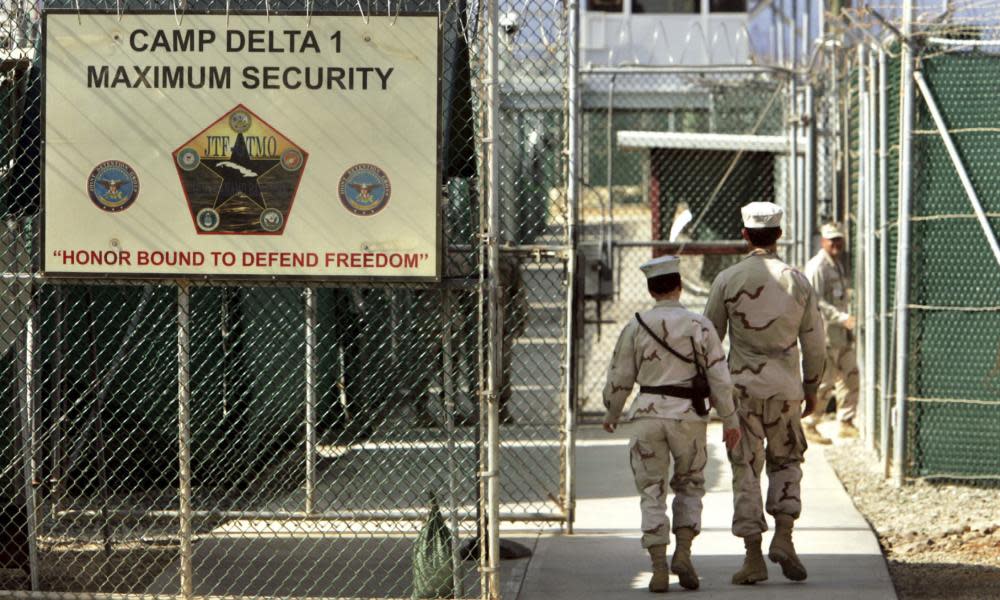Guantánamo detention facility in limbo despite Trump's vow to 'load it up'

One month into Donald Trump’s administration, the future of the wartime prison at Guantánamo Bay is in a holding pattern, mirroring the indefinite detention its populace experiences.
The Trump White House, strongly supported by the Republican-controlled Congress, has repeatedly pledged to expand the Guantánamo population from the 41 men, longtime prisoners all, whom Barack Obama left there after failing to close Guantánamo.
On the campaign trail, Trump repeatedly pledged to supersize the complex, pledging to “load it up with some bad dudes”.
Trump’s vivid language apart, that much has long been Republican orthodoxy; even before Obama’s election, Mitt Romney proposed to “double Guantánamo”.
But Trump raised eyebrows by telling the Miami Herald last summer he was open to holding American citizens suspected of working with Islamic State (Isis) at the detention facility and trying them in its military tribunals – something detention lawyers consider, at minimum, a major stretch of Trump’s legal authorities. No US citizen has ever been detained at Guantánamo.
Thus far, however, Trump has hit a bureaucratic snag.
Several versions of a draft executive order on detentions and interrogations have circulated during the opening weeks of the administration. An early version sought to restore the CIA’s authority to torture people at undisclosed prisons. Defense secretary Jim Mattis and CIA director Mike Pompeo appear to have beaten that proposal back.
What remained, in a subsequent draft, was a mandate to hold Isis captives at Guantánamo, which would clear the way for the first influx of detainees since 2008.
Yet the draft has yet to be adopted. The future of Guantánamo remains a subject of discussion between the the White House and the Pentagon.
Those discussions are about to face substantial bureaucratic pressures, as next week Mattis is expected to deliver a plan for escalating the war against Isis. During Obama’s presidency, military officers in operational positions, such as the former joint special operations command leader William McRaven, told Congress that the absence of a clear policy on detentions created battlefield confusion for special operations forces. Analysts charged that it incentivized the killing of terrorist suspects rather than their capture.
For now, Guantánamo is on something like autopilot.
There have been no transfers out of Guantánamo under Trump – the last round took place the day before Obama left office, leaving 41 detainees imprisoned – but Obama’s mechanism for clearing a detainee for release remains. A quasi-parole panel known as the Periodic Review Board met on 9 February to consider the case of the Yemeni detainee Omar Muhammad Ali al-Rammah. On 28 February, it is scheduled to hear the case of another Yemeni, Sharqawi Abdu Ali Al Hajj.
At the Pentagon, the senior-most official responsible for detainee policy remains Alisa Stack, who has served in that role since 2015. During the final years of Obama’s push to close Guantánamo, Stack, a career bureaucrat and not a political appointee, supervised a review of potential alternative sites inside the continental US to house detainees. The effort was a lightning rod for Congress and is unlikely to yield anything under Trump.
But Obama’s Pentagon envoy for closing Guantánamo, the political appointee Paul Lewis, quietly left his job in early February, Pentagon spokesman Maj Ben Sakrisson confirmed, characterizing Lewis’s departure as part of the typical turnover when administrations change.
The Guantánamo holding pattern attracted new attention after Isis claimed a Briton formerly held at the detention center, Jamal al-Harith, also known as Ronald Fiddler, became a suicide bomber in Iraq. The Pentagon confirmed someone by that name was held at Guantánamo between February 2002 and March 2004, but not that the same person committed the attack.
“We cannot confirm his death, as the occurrence of the same name does not necessarily equate to this being the same individual,” Sakrisson said.
As a retired officer in 2015, Mattis gave a grim warning to Congress about the potential fate of a released detainee recaptured by the US, as part of a warning to halt Guantánamo transfers.
“If our troops find that they are taking someone prisoner a second time, and they’ve just scraped one of their buddies off the pavement and zipped him in a bag, the potential for maintaining the ethical imperative we expect of our armed forces is going to be undercut, if in fact the integrity of our war effort does not take those people off the battlefield permanently if taken prisoner,” Mattis told a Senate panel.
“In other words, they will take things into their own hands under the pressures of warfare.”

 Yahoo News
Yahoo News 
